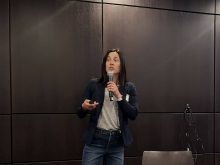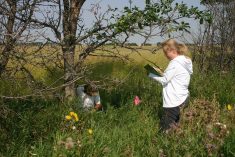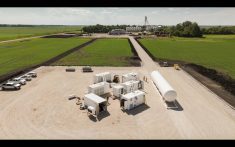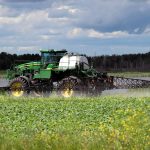A sustainable future doesn’t need government intervention, it needs a free market and self-regulated industry, the head of the Samuel Roberts Noble Foundation told the recent GrowCanada conference.
“Give me an open market, free of retaliatory trade restrictions and a predictable regulatory environment to advance technologies, and I’ll find a way to be profitable and do great things at the same time for the environment,” said Bill Buckner, a former Bayer CropScience CEO and past president of CropLife America.
Buckner is now president of the Samuel Roberts Noble Foundation, an Oklahoma-based non-profit research and extension institution focusing on farm productivity.
Read Also

CUSMA access key among other trade noise: Seeds Canada panel
Seeds Canada conference panelists say Canada needs to stay focused and wait as U.S. trade and tariff chaos develops, and a Canada-U.S.-Mexico Agreement review looms
“At the end of the day no one wants to see the agricultural producer suffer, hence the development of an old movement, spun in a different way, called free market environmentalism,” Buckner said.
Central to the idea of free market environmentalism is that business should be entirely self-regulated, he said, indicating that the interests of business are in tandem with those of environmental protection.
But he also added that those pushing for sustainability and environmental protection can’t expect to get all the things they want in one go. It will take time, Buckner said.
“Farmers and producers, they’re environmentalists too, but yet they have to make a profit at the end of the day,” he said. “The free market concept is that we want you to make a profit, we want to help you make a profit, we’ve got ideas where you can perhaps be better stewards by doing different things and using new technologies and bringing science to another level, so that you can enjoy the free market aspects of it, make money and at the same time do great things for the environment.”
Buckner said he doesn’t believe a self-regulated biotechnologies industry would result in the kinds of issues experienced in other once self-regulated industries, like the U.S. mortgage sector.
In 2008, a subprime mortgage crisis south of the border, toppled major banks and plunged the U.S. into a deep recession.
“That’s a whole different set of circumstances,” Buckner said.
He noted the agriculture sector in the United States is heavily regulated by the Environmental Protection Agency, describing the relationship as a “good tussle back and forth” at times.
However, if business is going to avoid government-imposed regulations, Buckner said it needs to take the lead and self-regulate, something he learned during his time working with companies in Canada.
“Given the right business environment, the right people in government, the right communication message and the right industry leadership, they could in fact stay ahead of the regulatory curve and preserve as much freedom to operate while advancing agriculture in a way now known as sustainable,” he said.
But while business may not want government regulations, the free market isn’t opposed to government money.
Buckner said while major corporations have good intentions, they “can be long on vision but short on cash.”
His answer is public-private partnerships.
“Today’s agriculture requires more private involvement in order to help reshape the landscape of our public sector,” he said, adding that “purposeful” outcomes need to be the focus of research.



















